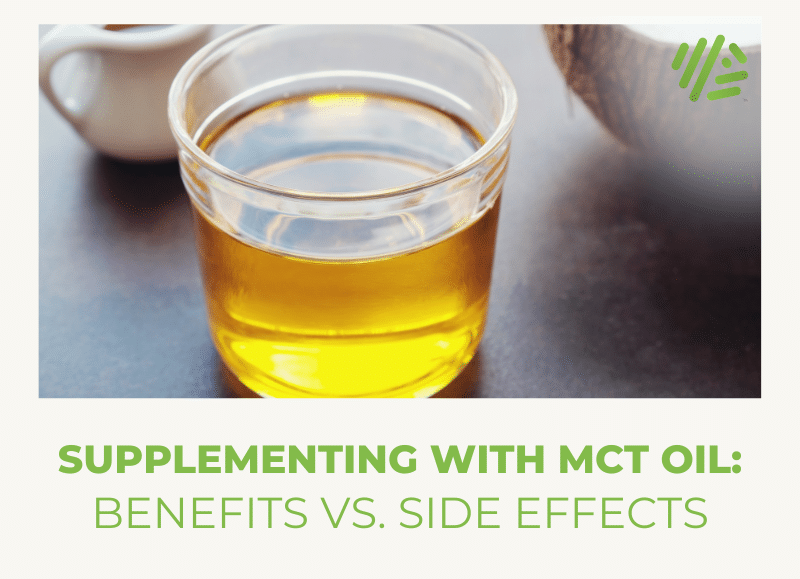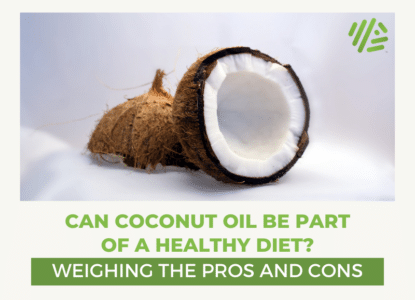Supplementing With MCT Oil: Benefits vs. Side Effects
Article at a Glance
- MCT oil is a type of fat the the body can use for energy.
- One study found that MCT oil improved cognitive function in a group of “mild to moderate” Alzheimer’s patients who do not carry any copies of APOE4. This would suggest it is important to know APOE status prior to using MCT oil.
- Common MCT oil side effects include massive increases in LDL-C, heart palpitations, and digestive discomfort.
- Most of the evidence for MCT oil benefits in humans is weak, and more research is needed.
Genes Mentioned

Contents [Hide]
MCT Oil supplements are popular in many circles, with health seekers using the supplement for everything from boosting cognitive function, to clearing the gut of unwanted pathogens, but what is the evidence for and against using this “healthy fat?”
Let’s dive in and evaluate both the benefits and side effects of supplementing with MCT oil. We will spare you the SEO filler, and cut right to the chase.
Evidence based benefits of MCT Oil
#1. MCT Oil can help achieve ketosis
MCT oil is a precursor to Beta-hydroxybutyrate, a “ketone” or fat molecule the body can use for energy. 1
There are two places you can get ketones from – you can eat them in supplement form or you can get them when your body burns its own fat stores. Supplemental ketones are known as “exogenous” ketones, and MCT oil is one of the best known exogenous ketone sources since your body can use it as a quick source of fat energy. 1
Keep in mind that not everyone is capable of achieving ketosis genetically.
#2. MCT as an Antimicrobial Agent
Some studies have shown the lauric acid found in coconut oil inhibited the growth of Clostridium bacteria, a major cause of antibiotic associated diarrhea.2
Others have found the medium chain fatty acids found in MCT oil were effective at killing multiple harmful pathogenic bacteria strains.3
Best MCT Oil for Killing Bacteria and Fungal Pathogens
It is important to keep in mind that most MCT oil has the lauric acid removed, since lauric acid doesn’t function as an immediate energy source like caprlyic or capric acid does. If your goal is the antimicrobial activity of lauric acid, it’s better to just take a spoonful of coconut oil rather than resorting to MCTs.
Capric acid is a known anti-fungal agent, and has shown the ability to kill Candida in vitro (in test tubes).
Most of the research on the antimicrobial benefits of coconut oil have been focused on lauric acid and capric acid, rather than the ketone boosting caprylic acid.
#3. MCT Oil and Neurological Health
While many who have tried MCT oil notice a cognitive boost, what does the medical literature have to say? Are there studies which back up this effect?
I couldn’t find many (if you have some good ones please share in the comments). We do know that MCT’s can cross the blood brain barrier as fuel for the brain. There is this one study which looked at the ability of MCT oil to increase ketones levels in the brain of Alzheimer’s patients as a way to make up for impaired glucose metabolism. The study found that MCT use doubled consumption of ketones in the brains of Alzheimer’s patients.
Another, more interesting study, found that MCT oil improved cognitive function in a group of “mild to moderate” Alzheimer’s patients who do not carry any copies of APOE4.
For more on Alzheimer’s and diet, see this blog post.
Side effects of MCT Oil
In our view, most of the articles online listing MCT oil benefits have overreached in order to make their articles longer to please Google. The side effects and potential negative impact on cardiovascular health are, in our view, a larger part of the story with MCT supplementation, a regimen that involves massive doses of saturated fat.
#1. MCT Oil Can Raise “Bad Cholesterol”
There is a lot of bad information online about the impact of elevated LDL-C levels. While many in the low carb community like to question whether LDL is causal in heart disease in insulin sensitive people, the verdict is in – lower is better when it comes to APOB levels.
In many of us, a diet high in saturated fat will meaningfully increase LDL levels, which meaningfully increases the risk for heart disease over the long term. MCT oil carries with it mega-doses of saturated fat which will blow out LDL numbers in a subset of the population.
As we learn from the Retterstøl study, the variability in response to a diet high in saturated fat is tremendous. Some will see little difference in their levels of “bad cholesterol” when using MCTs, others will see massive spikes. The people who see the big increases are known as “hyper responders,” meaning they see a large uptick in LDL-C when eating a lot of fat, especially saturated fat.
The bottom line is heavy use of MCT oil can increase levels of bad cholesterol in some people. That is a known side effect. From there, it’s up to you and your doctor to decide where you would like to see LDL levels stay for optimal health.
#2. MCT Oil and heart palpitations
Many people who take MCT oil experience heart palpitations. Studies in rats have shown saturated fatty acids and coconut oil to be proarrhythmic, meaning they stimulate heart palpitations.
#3. MCT Oil and Upset Stomach
This is a really common side effect of MCT oil, probably the most common. It’s well known that if you take too much, the “disaster pants” kick in resulting in diarrhea and unwanted trips to the bathroom.
Overcoming MCT Oil Side Effects
It could be that some people do best staggering use of MCTs to once or twice a week to get benefits on those days, but avoid regular use so as not to trigger the side effects that come as making MCTs part of your daily routine. As with anything else, proper dosing is key.
Some find that they tolerate MCTs quite well at lower doses and when they use on a very occasional basis (twice a year). It is usually after multiple days of use that the worst side effects kick in.
Key Takeaways
MCT oil offers an immediate source of fat energy that can bring with it noted benefits such as a boost in mood and cognitive performance.
However, supplementing with MCT oil is not without side effects. In some people it may cause calcium levels to rise in the blood leading to heart palpitations and a racing feeling.
In others, digestive distress will be an issue.
Last, if you see a major uptick in LDL after using MCT oils, take it seriously, not everyone can handle the mega-doses of saturated fat that come with MCTs.




Encephalitis survivor and trying to start a new eating and fitness plan
Tried MCT oil looking for brain and fitness benefits as well help for controlling seizures
Made we very sick feeling- like acid stomach, diarrhea etc etc
Took 1T serving twice the first day—
Will this go away ?
Are there things to look for when purchasing
Any and all comments are appreciated- this would be beneficial for me if I can take it
Thanks for the comment Allison. Always best to discuss side effects with your doctor. In terms of MCT oil being beneficial, it’s not clear to me why anyone would need to take MCT oil. MCT oil “benefits” are primarily driven by heavy marketing from companies that sell MCT oil. I would suggest checking out the work of Dr. Valter Longo.
I experienced an awful ‘die off’ of toxins I guess with only 1 tbl. lots of diarrhea. flu like symptoms like you mentioned in your article. does this mean I’m unhealthy? ugh. Staying away from it.
Elizabeth,
Thank you for the comment. While it is definitely useful to have stories like yours, of severe MCT oil side effects, shared, we can’t say in a forum like this what the implications are. Best to take this issue to your doctor.
A few years ago, I started to try various Vitamin D3 (Chole-calciferol) oral supplements, for example by Thorne. The ingredients included ARTIFICIAL “MCT’s” (Medium Chain Triglycerides). I had awful side effects, no matter how much I diluted the ARTIFICIAL “MCT’s”. The side effects included RACING HEART, INSOMNIA, etc. I finally figured out that it was the ARTIFICIAL “MCT’s” that were causing my side effects. Then, I discovered that COCONUT OIL/FAT never gave me those awful side effects, even though coconut oil/fat is a NATURAL/GOOD source of MCT’s (Medium Chain Triglycerides). So, my advice is to READ LABELS with a good MAGNIFYING GLASS, and avoid ARTIFICIALLY PRODUCED “MCT’s” (Medium Chain Triglycerides), and instead, get your MCT’s NATURALLY, from Coconut products or any other natural products. Sincerely, Carol Sidofsky (77 and hanging in there): fsds@rkymtnhi.com
Bought nutiva MCT oil from Costco, took 1 tbsp straight up two days ago noticed slight upset stomach nothing serious. Today put 1 tbsp in my coffee felt fine all day but earlier this evening my stomach started gurgling. I was watching TV and all of a sudden was overheating to the point where I had to take my shirt off. Went to bed started with bad gas then ran to the bathroom, went back to bed and felt heart palpitations and anxiousness, got up to drink some water. Googled “MCT upset stomach”and came across this forum, previous search’s just showed beneficial effects so this is interesting. Will keep researching.
Randy, almost the same thing happening with me. It was my first time using it and it upset my stomach greatly. Also, I felt like I was having an anxiety attack. Not fun!
My husband and I have been taking at least a tbsp in our coffees daily for 3 years. (we put a squirt with every coffee and guess that we get 1 tbsp total). We are usually on low carb or in ketosis.When we first began it upset our stomachs. It definitely makes us more alert and faster mor thorough in our thinking. Now I have tested very high for my B12 levels over the last 3 years. All my other blood work is good. I am 64 this is highly unusual. Any ideas?